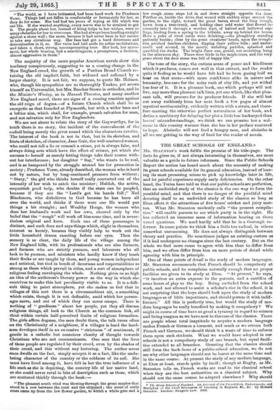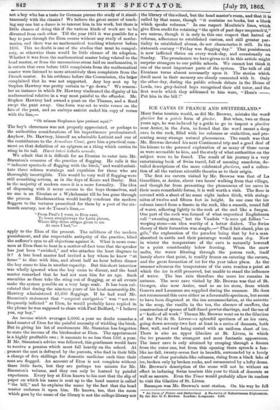THE GREAT SCHOOLS OF ENGLAND.* MR. SrAuNroses work fulfils the
promise of his title-page. The facts he gives us, if not always interesting in themselves, are most valuable as a guide to future reformers. Since the Public Schools
Report the nation has heard much about the necessity of making its great schools available for its general education, instead of leav- ing its most promising scions to pick up knowledge later in life, and let painful experience supply early deficiencies. On the other hand, the Tories have told us that our public schools are perfection, that an undivided study of the classics is the one way to form the youthful mind, and that there is no danger of the youthful mind devoting itself to an undivided study of the classics so long as Eton offers it the attractions of five hours' cricket and juicy mut- ton. What Mr. Staunton modestly calls "the present compila- tion" will enable parents to see which party is in the right. He has collected an immense mass of information bearing on those vexed questions. We need hardly add that he is a thorough re- former. In some points we think him a little too radical, in others somewhat unreasoning. He does not always distinguish between theory and practice. He sometimes judges an existing custom as if it had undergone no changes since the last century. But on the whole we find more cause to agree with him than to differ from him, and we often differ from him on mere points of detail while agreeing with him in principle.
One of these points of detail is the study of modern languages. Mr. Staunton recommends that French should be compulsory at public schools, and he complains naturally enough that no proper facilities are given to its study at Eton. "At present," he says, "It involves an extra expense to the parents, and a sacrifice of some hours of play to the boy. Being excluded from the school work, and not allowed to assist a scholar's rise in the school, it is not surprising that the boys should look upon the study of modern languages as of little importance, and should pursue it with indif- ference." All this is perfectly true, but would the study of mo- dern languages be really benefited by making it compulsory? We might in course of time have as great a tyranny in regard to science and living tongues as we have now in the.case of the classics. There are people whose total inaptitude to acquire a modern language makes French or German a torment, and much as we esteem both French and German, we should think it a waste of time to enforce them upon such students. What we would have adopted in our schools is not a compulsory study of one branch, but equal facili- ties extended to all branches. Granting that the classics should still form the back-bone of a public-school education, we do not see why other languages should not be learnt at the same time and in the same course. At present the study of any modern language, at Eton at least, stands quite by itself ; though at Rugby, as Mr. Staunton tells us, French works are read in the classical school when they are the best authorities on a classical subject. Why should not the same course be adopted elsewhere ? Why should
• Th, Great Schools of England. An Account of the Foundltion, Endowments, and Discipline of the Chief Seminaries of Learning in England, Ite., Sc. By Howard Staunton. Loudon; Sampson Low. 1865. not a boy who has a taste for German pursue the study of it simul- taneously with the classics? We believe the great seeret of teach- ing any one but a dunce is to interest him in his work, but there is little chance of doing this if the various kinds of work are to be divorced from each other. Till the year 1851 it was possible for a boy to pass through the Eton course without any study of mathe- matics, and there was no mathematical teaching whatever before 1836. This no doubt is one of the studies that mast be compul- sory, as otherwise there would be little chance of its adoption. Whether it was from the mathematical master being related to the head master, or from the unconscious stress laid on mathematics, it is certain that even before 1851 complaints from the mathematical master were listened to more attentively than complaints from the French master. In his evidence before the Commission, the latter complained that he was not supported. Any boy sent up by Stephen Hawtrey was pretty certain to "go down." We remem- ber an instance in which Dr. Hawtrey vindicated the dignity of his mathematical relative in a way most painful to the offender. Mr. Stephen Hawtrey had owned a punt on the Thames, and a flood swept the punt away. One form was set to write verses on the fate of the punt, and an embryo satirist ended his copy of verses with the line,—
" Oh utinara Stephanos ipso perisset aqua!"
The boy's cleverness was not properly appreciated, or perhaps to the authorities considerations of his impertinence predominated. Anyhow, Dr. Hawtrey, himself an admirable Latinist and one of the contributors to the Arundines Cami, gave him a practical com • ment on that definition of an epigram as a thing which carries its sting in its tail. Ilteret lateri lethalis arundo.
We admit that it is difficult for an Etonian to enter into Mr. Staunton's censures of the practice of flogging. He calls it the "indecent spectacle of flogging with the birch," and would substi- tute three solemn warnings and expulsion for those who are thoroughly incorrigible. This would be very well if flogging were still something serious, as in the days of Keate and Busby. But in the majority of modern cases it is a mere formality. The idea of dispensing with it never occurs to the boys themselves, and no one is an Etonian or a Wykeharaist till he has gone through the process. Rhadamanthus would hardly condemn the modern floggers to the tortures prescribed for them by a poet of the six- teenth century, nor do Tamer's lines,— "From Paul's I went, to Eton sent,
To learn straightways the Latin phrase,
Where fifty-three stripes given to me At once I had,"—
apply to the Eton of the present. The mildness of the modern punishment, and the respectable antiquity of the practice, blind the sufferer's eyes to all objections against it. What is more com- mon at Eton than to hear in a matter-of-fact tone that the speaker has just been "swished," and who attaches the least disgrace to it? A late head master had invited a boy whom he knew "at home" to dine with him, and about half an hour before dinner the boy came to him in another capacity. But this short interview was wholly ignored when the boy came to dinner, and the head master remarked that he had not seen him for an age. Such amenities as thaw take the sting out of flogging, or at all events make the system possible on a very large scale. It has been cal- culated that during the nineteen years of his head-mastership Dr. Hawtrey administered 43,600 floggings. If he had read Mr. Staunton's statement that "corporal castigation" was "not un- frequently inflicted" at Eton, he would probably have replied in the phrase he was supposed to share with Paul Bedford, "I believe you, my boy."
An income which averages 5,000/. a year no doubt consoles a head master of Eton for the painful necessity of wielding the birch. But in giving his list of emoluments Mr. Staunton has forgotten to state the income of the birchmaker at Eton. The appointment is a highly profitable one ; it amounts to no less than 150/. a year. If Mr. Staunton's advice was followed, this gentleman would have to receive a pension which must fall heavily on the school. At -present the cost is defrayed by the parents, who find in their bills a charge of five shillings for domestic medicine each time their sons are flogged. An account of Eton is not complete without these little facts, but they are perhaps too minute for Mr. Staunton's volume, and they can only be learned by painful experience. Every boy at Eton knows to his cost that the slip of paper on which his name is sent up to the head master is called "the bill," and he explains the name by the fact that the head master endorses it upon him. He knows, too, that the room which goes by the name of the library is not the college library nor the library of the school, but the head master's room, and that it is called by that name, though "it contains no books, but a block which speaks volumes." In one respect Moultrie's lines, which give Eton credit for retaining "the spirit of past days unquench'd," are untrue, though it is only in this one respect that hatred of reforms, adherence to established custom, and still greater par- tiality to established abuses, do not characterize it still. In the sixteenth century "Friday was flogging day." That punishment is now inflicted thrice on every week-day, and occasionally oa Sunday. The prominence we have given to it in this article might surprise strangers to our public schools. We cannot but think it one of the most important parts of the system. The talk of old Etonians turns almost necessarily upon it. The stories which dwell moat in their memory are closely connected with it. Only the other day, during the public schools debate in the House of Lords, two grey-haired boys recognized their old tutor, and the
first words which they addressed to him were, "Here's . Put him in the bill !"































 Previous page
Previous page